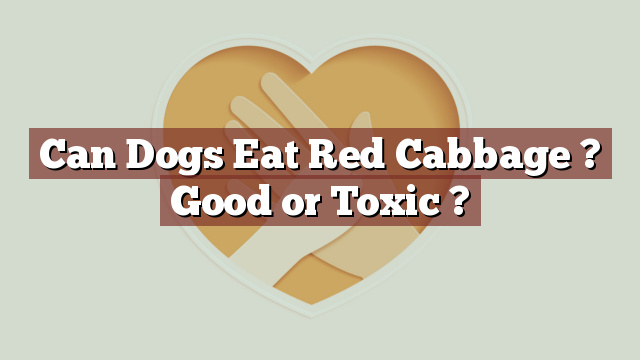Can Dogs Eat Red Cabbage? Good or Toxic?
As responsible pet owners, it is crucial to be aware of what foods are safe for our furry friends. Can dogs eat red cabbage? This question often arises when we’re preparing meals and want to share our healthy choices with our canine companions. In this article, we will explore the nutritional value of red cabbage, discuss its safety and potential risks, and provide guidance on what to do if your dog consumes this vegetable.
Nutritional Value of Red Cabbage: Vitamins, Minerals, and Antioxidants
Red cabbage, a member of the cruciferous vegetable family, is renowned for its vibrant hue and numerous health benefits. This vegetable is packed with essential nutrients, including vitamins A, C, and K, as well as minerals such as potassium and manganese. Additionally, red cabbage is rich in antioxidants, which can help support your dog’s immune system and overall well-being.
Can Dogs Eat Red Cabbage? Safety and Toxicity Explained
While red cabbage offers a range of valuable nutrients, it’s crucial to consider its safety for dogs. Can dogs eat red cabbage? Yes, they can! Red cabbage is safe for dogs to consume in moderation. However, it is important to note that every dog is unique, and individual sensitivities may exist. Some dogs may experience gastrointestinal upset if they consume large amounts of red cabbage. Therefore, it is recommended to introduce this vegetable slowly into your dog’s diet and observe their reaction.
Potential Risks or Benefits: Weighing the Pros and Cons for Dogs
When it comes to the potential risks and benefits of red cabbage for dogs, moderation is key. The high fiber content in red cabbage can be beneficial for canine digestion, helping to regulate bowel movements. The antioxidants present in this vegetable may also contribute to your dog’s overall health and immune system function. However, excessive consumption of red cabbage may lead to flatulence, bloating, or diarrhea in some dogs. It is essential to monitor your dog’s response and adjust their diet accordingly.
My Dog Ate Red Cabbage: What Should I Do? Steps to Take
If your dog accidentally consumes a substantial amount of red cabbage or experiences any adverse reactions, it is important to take appropriate steps. Firstly, observe your dog for any signs of discomfort or distress. If you notice any unusual symptoms, such as vomiting, lethargy, or severe digestive issues, it is advisable to contact your veterinarian for guidance. They will provide tailored advice based on your dog’s specific situation.
Conclusion: Moderation and Monitoring for a Healthy Canine Diet
In conclusion, red cabbage can be a beneficial addition to your dog’s diet when given in moderation. Its nutritional value, including vitamins, minerals, and antioxidants, can contribute to your dog’s overall health and well-being. Remember to introduce red cabbage gradually and monitor your dog for any adverse reactions. As with any dietary changes or concerns, consulting with your veterinarian is always a wise decision. By prioritizing moderation and monitoring, you can ensure a healthy and balanced diet for your beloved canine companion.
Thank you for investing your time in exploring [page_title] on Can-Eat.org. Our goal is to provide readers like you with thorough and reliable information about various dietary topics. Each article, including [page_title], stems from diligent research and a passion for understanding the nuances of our food choices. We believe that knowledge is a vital step towards making informed and healthy decisions. However, while "[page_title]" sheds light on its specific topic, it's crucial to remember that everyone's body reacts differently to foods and dietary changes. What might be beneficial for one person could have different effects on another. Before you consider integrating suggestions or insights from "[page_title]" into your diet, it's always wise to consult with a nutritionist or healthcare professional. Their specialized knowledge ensures that you're making choices best suited to your individual health needs. As you navigate [page_title], be mindful of potential allergies, intolerances, or unique dietary requirements you may have. No singular article can capture the vast diversity of human health, and individualized guidance is invaluable. The content provided in [page_title] serves as a general guide. It is not, by any means, a substitute for personalized medical or nutritional advice. Your health should always be the top priority, and professional guidance is the best path forward. In your journey towards a balanced and nutritious lifestyle, we hope that [page_title] serves as a helpful stepping stone. Remember, informed decisions lead to healthier outcomes. Thank you for trusting Can-Eat.org. Continue exploring, learning, and prioritizing your health. Cheers to a well-informed and healthier future!

